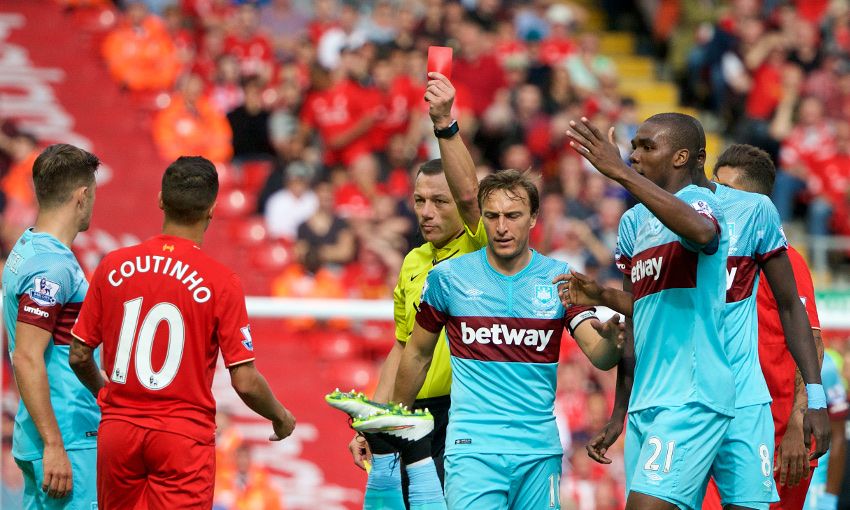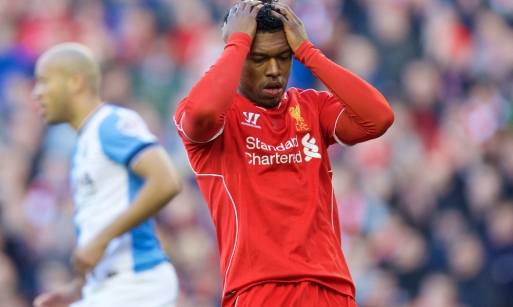Olympiakos and Istanbul, the 2001 or 2006 FA Cup Final. In all, the majority of Liverpool’s most celebrated moments in recent times have been the result of a comeback from the brink of certain defeat. And yet, under Brendan Rodgers our never-say-die attitude has been replaced with an uncomfortably consistent failure to recover from moments of adversity. Indeed, the days of being ‘comeback kings’, appears to be over.
Last season Liverpool came back to win just one game after conceding first (Leicester 3-1) a statistic that appears to be indicative of Brendan Rodgers’ tenure at the club. And, after a dismal attempt to claw back anything against West Ham, Twitter statistician @atrivedi99 handily amassed some compelling stats on how well Liverpool performed in the past three seasons having conceded first.
In the 2012/13 season, out of the 42 available points to gain when conceding first, Liverpool won 16 points.
In the 2013/14 season, out of the 30 available points to gain when conceding first, Liverpool won 12 points.
In the 2014/15 season, out of the 33 available points to gain when conceding first, Liverpool won just 4 points.
Therefore, in total when conceding first Liverpool have won 32 points out of an available 105 (which equates to 30%).
Now, even in seasons of varying success when finishing 7th, 2nd, and 6th it is clear that under Rodgers, comebacks have become a thing of the past. To put this into perspective, during Benitez’s successful 2008/09 season in charge Liverpool came from behind to win more games than Rodgers’ has achieved in over three years at the club. With rose-tinted glasses firmly in place memorable wins against Manchester City, United, Boro, Wigan and Portsmouth defined a squad that turned defeat into victory time and time again.
Yet, these unforgettable turnarounds seem disconcertingly impossible in the Rodgers’ era. A notion that is surely representative of a larger struggle for Rodgers to effectively manage in high-risk tactical areas.
For Rodgers’ the match on Saturday against West Ham is characteristic of his inability to manage games in which we need to chase goals. Having conceded two goals before half time, Brendan opted to bring on Alberto Moreno after the break. Yet instead of utilizing the substitution of the Spaniard as a winger and forming a 3-5-2 or 3-4-3, Brendan instead reverted to what was effectively a 5-man defense with Lucas Leiva also employed as a defensive midfielder.
Without natural wingers Liverpool failed to capitalize on the space afforded by these wingbacks due to poor delivery and their own requirement to manage defensive responsibility. Moreover, the removal of Emre Can greatly reduced the pressure on West Ham’s central midfield, affording them more time on the ball therefore reducing our opportunity to win back the ball.
Brendan’s tactical deficiencies can perhaps also be attributed to the lack of quality personnel on the bench, who could perhaps directly influence the course of events. Crucially, players like Ibe, Rossiter and Origi are not developed enough to come on and change the game instantaneously. And, although Danny Ings proved a lively introduction it was by far a case of too little too late, when perhaps a two-man strike force, providing Benteke with much needed support, may have affected the game earlier on.
In light of this, the decision to loan out Markovic to the Turkish side Fenerbahçe appears ever more bewildering when considering the loss of Raheem Sterling to Manchester City. Indeed, the choice to loan out a talented natural winger only consistently employed at wing-back leaves us with little attacking width remaining in the squad. With Rodgers also opting to stick with three central midfielders, even with Lallana and Henderson injured, this meant that Benteke was isolated and the gap between midfield and attack was stretched.
Against West Ham the absence of our first team captain was also surely a contributing factor, yet with Henderson in the side would we have truly been able to mount a comeback? Probably not, as against similarly beatable teams like Aston Villa, Hull and Newcastle last season, the moment our confidence is rocked we fail to recover.
Although a lack of desire or motivation may be too harsh of a criticism on a still-gelling squad, there is certainly a lack of confidence and an unchallenged sense of complacency that runs through the ranks. And, you get the sense that a more fired-up team would have chased a goal rather than settle for possession and refuse to commit men forward. Whether Rodgers is directly responsible for this is unlikely, especially considering the praise amounted on the Northern Irishmen by past and current players. Yet, fans have perhaps seen more of Rodgers’ as the tactician rather than the inspirational leader of the club.
Certainly, this season and in the last, our lack of firepower due to the loss of Suarez and the injury of Daniel Sturridge is a key indicator of why we do not win after conceding first. However this simply does not explain previous seasons under Brendan Rodgers. The sense of an inevitable loss when conceding first, even at Anfield, is a far too common occurrence.
Tactically, it appears that Rodgers is unwilling to risk conceding more goals and significantly change the attacking intent of our team. Yet, ironically the refusal to bring on more attackingly minded players in actuality creates a stasis that leads to the same type of goals being conceded again and again. (A particularly bemusing substitution being the removal of Firmino, our most creative outlet, even after losing Coutinho to an unnecessary red card).
It appears in this sense Liverpool all too easily play into the hands of other manager’s tactics. A feature of this also being the infinitely frustrating self-sabotage of consistently and needlessly fouling players in harmless areas of the pitch or when they could simply bide their time to win the ball back without giving away a free-kick.
There are certainly a litany of contributing factors which could suggest why Liverpool fail to come back from games after conceding first; including the difficult transition created by the loss of Gerrard, the lack of key chances created by a new creative force and even our continual defensive frailty. Yet, perhaps the only certain factor in our inability to mount a comeback is the management of Brendan Rodgers.
Although ‘comebacks’ are perhaps a small part of Liverpool’s current difficulties, the infrequency of turning games around points to Rodgers’ stubbornness in player selections and his inability to manage risk/reward situations. This continued failure to motivate and inspire his team or tactically outmanoeuvre the opposition in times of adversity might very well lose him his job.
Ben Butler
Latest posts by Ben Butler (see all)
- The risk of Klopp’s transfer waiting game - September 2, 2016
- Have Liverpool done enough in the transfer market? - August 20, 2016
- What can we take away from Liverpool’s win against Tranmere? - July 8, 2016


